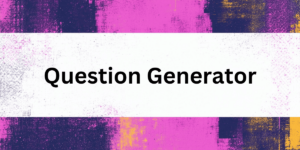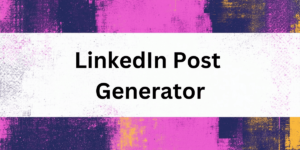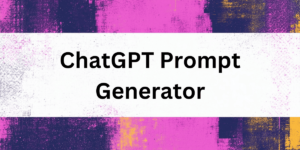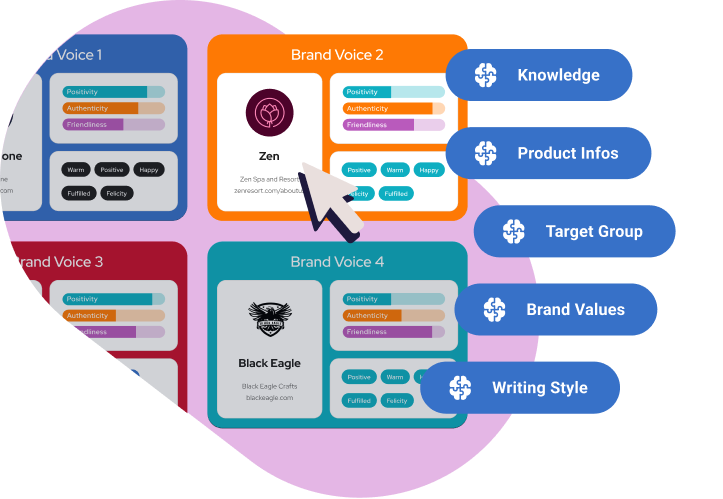Have you ever wondered why, despite your best efforts, your website isn’t converting visitors into customers as effectively as you’d like? You’re not alone. The key to unlocking your site’s potential lies in the art and science of CRO marketing. This blog post is your comprehensive guide to mastering Conversion Rate Optimization (CRO), featuring five powerful strategies that will transform your approach and results.
Summary 📌
- Improving website effectiveness for higher conversions through performance analysis, barrier identification, and understanding user needs.
- AI revolutionizes CRO by offering user behavior insights, automating A/B testing, and customizing marketing strategies for improved conversion results.
- Explores AI-driven content creation strategies to boost engagement with personalized, SEO-optimized content and optimize content formats for higher conversion rates.
- Centralizes AI data analysis to pinpoint UX issues, optimize navigation, enhance chatbot customer service, and deliver personalized content for a seamless user journey.
- Explores how AI-driven analytics offer real-time feedback, predictive insights, and precise audience segmentation for ongoing optimization of CRO outcomes.
Fundamentals of CRO Marketing for Website Performance
Conversion Rate Optimization (CRO) marketing might seem complex at first glance, but it’s rooted in a simple goal: enhancing your website’s effectiveness to boost conversions. Conversions can range from financial transactions to newsletter sign-ups or any action you deem valuable. The essence of CRO lies in understanding and optimizing the user’s journey on your site to encourage them to take the desired action. Let’s focus on three key foundations to enhance website performance through CRO Marketing:
1- Analyzing Performance Data:
It starts with analyzing current performance data, identifying barriers to conversion, and testing hypotheses through A/B testing, user feedback, and analytics. For instance, if you notice a high drop-off rate at your checkout page, there might be underlying issues like a complicated checkout process or unexpected shipping costs deterring your customers. Addressing these issues can significantly improve your conversion rate. Additionally, using effective client project management practices can help track and prioritize tasks for resolving issues, ensuring that solutions are implemented in a timely and organized manner.
By investing in project management courses, you equip yourself with the tools to address barriers to conversion methodically.
2- Understanding your Audience:
Moreover, CRO is not just about making minor tweaks; it’s about deeply understanding your audience. What are their pain points? What motivates them? By answering these questions, you can craft a more persuasive and user-friendly experience on your pages that aligns with their needs and expectations.
In essence, CRO marketing is an ongoing process of learning, testing, and refining. It’s about creating an intuitive, seamless experience on your site that resonates with your visitors, compelling them to take action.
3- Optimizing your website’s content:
According to this article from Impactplus,
"The average conversion rate for landing pages is around 2.35%. The top 25% of sites convert from 5.31%, while the top 10% of sites convert from 11.45%."
Which leads us to the importance of a good landing page conversion rate.
Through consistent testing and optimization of your site’s content, you can uncover invaluable insights that can help refine your strategies for better conversion rates. Remember, every visitor represents a potential conversion, and by optimizing the user experience, you’re significantly increasing the likelihood of converting visitors into loyal customers. Embracing CRO is about embracing a growth mindset, where every piece of data and every user interaction on your site is an opportunity to improve and succeed.

AI for Data-Driven Decision Making in CRO
AI technology is enhancing CRO strategies by providing valuable insights into customer behavior, improving website optimization, and enabling personalized marketing approaches. Through AI-powered tools, marketers can track customer interactions, predict conversion likelihood, and conduct efficient A/B testing to enhance conversion rates.
AI’s real-time decision-making capabilities allow for dynamic content adjustments based on user preferences, leading to increased engagement and conversion rates. Leveraging AI in CRO empowers marketers to make strategic and data-driven decisions, maximizing the impact on the bottom line. By optimizing user experience, testing strategies, and providing valuable resources, businesses can attract and convert visitors into loyal customers, creating a personalized and seamless browsing experience that drives conversions. You can also leverage nearshore staff augmentation to develop your own custom AI tools and integrate them into your marketing strategies.
In essence, leveraging AI for data-driven decision-making in CRO empowers marketers to make informed, strategic changes that directly impact the bottom line.
Top 5 Strategies for CRO Marketing Success
Content creation with AI for CRO (Conversion Rate Optimization) marketing involves leveraging artificial intelligence tools and technology to create compelling and high-performing content that is optimized for converting website visitors into customers.
These are the top 5 strategies for CRO Marketing Success:
1. Personalization:
Tailoring your messaging and offers to individual users can boost conversion rates. By leveraging data and analytics to understand your audience’s preferences and behavior, you can create personalized experiences that resonate with them and drive conversions. Brand Hub is integrated with all of neuroflash’s copywriting tools to ensure that every piece of copy reflects your unique brand message and matches your target audience, increasing engagement and conversion rates. Simply upload your information, create your brand voice and watch ContentFlash generate customized content.

2. Data-driven insights:
AI can analyze large sets of data to identify trends and patterns that can help determine the most effective content strategies for driving conversions. Improving the user experience on your website or landing pages can significantly impact your conversion rates. This includes making sure your site is easy to navigate, mobile-friendly, and visually appealing. By creating an intuitive and seamless user experience, you can increase the likelihood of visitors converting.
3. A/B testing:
One of the most effective strategies for CRO is A/B testing, where you test different versions of a webpage or email to see which one performs better. By systematically testing various elements like headlines, call-to-action buttons, or images, you can optimize your conversion rates. With ChatFlash, you can automate the process by testing different variations of content to determine which performs best in terms of conversion rates.

4. Content optimization:
As well as landing page optimizationplay a crucial role in converting visitors into customers. With ContentFlash, you can analyze and optimize content for SEO, readability, and engagement, ensuring that the content is both user-friendly and search engine-friendly.

5. Content recommendations:
AI can analyze user behavior to deliver personalized content recommendations, increasing the likelihood of conversion. Understanding your customer’s journey from the moment they become aware of your brand to the point of conversion is key to optimizing your CRO strategy. By mapping out each touchpoint and identifying potential barriers to conversion, you can streamline the customer journey and guide visitors towards conversion more effectively.
Overall, leveraging AI for content creation in CRO marketing can help businesses improve their conversion rates by delivering more targeted, engaging, and optimized content to their audience. It can also help businesses save time and resources by automating various aspects of the content creation process.
Case Study: Personalized Marketing for Driving CRO
In this case study, we will explore how Star Hotel Booking, an online platform specializing in hotel reservations and bookings, successfully implemented personalized marketing strategies to drive increased conversions and customer engagement.
Step 1: Understanding the Audience
Star Hotel Booking began by conducting in-depth market research and analyzing customer data to understand their diverse audience segments. They identified key demographic information, purchasing behavior, and preferences among their customers, allowing them to create detailed buyer personas.
Step 2: Data Collection and Segmentation
Using a combination of CRM systems, analytics tools, and customer feedback, Star Hotel Booking collected and organized customer data into distinct segments based on shared characteristics and behaviors. These segments included business travelers, leisure travelers, and luxury vacationers.
Step 3: Personalized Content Creation
Star Hotel Booking developed personalized content tailored to each audience segment. They created customized email campaigns, hotel recommendations, and targeted ads based on the preferences and interests of each segment. For example, they sent personalized offers for luxury beach resorts to luxury vacationers and business-friendly accommodation options to business travelers.
Step 4: Implementing Marketing Automation
To streamline their personalized marketing efforts, Star Hotel Booking leveraged marketing automation tools to deliver personalized content at scale. They set up automated email campaigns triggered by specific customer actions, such as website visits or bookings, and used machine learning algorithms to optimize content delivery.
Step 5: Testing and Optimization
Star Hotel Booking continuously tested the performance of their personalized marketing campaigns through A/B testing, analyzing key metrics like conversion rates, click-through rates, and revenue generated. They iterated on their strategies based on data insights, refining messaging, offers, and targeting to improve campaign effectiveness.
Step 6: Measuring Results
By tracking KPIs and analyzing campaign performance, Star Hotel Booking saw a significant increase in conversions and customer engagement. They observed higher conversion rates, improved customer loyalty, and increased revenue generated from their personalized marketing efforts.
Conclusion:
Through strategic implementation of personalized marketing strategies, Star Hotel Booking successfully drove increased conversions and customer engagement. By understanding their audience, segmenting data, creating personalized content, implementing marketing automation, testing, and measuring results, Star Hotel Booking was able to create meaningful connections with their customers and achieve tangible business results. Personalized marketing proved to be a powerful tool in driving success for Star Hotel Booking in the competitive online hotel booking industry.
Frequently Asked Questions
What is the CRO in marketing?
CRO, or Conversion Rate Optimization, in marketing refers to the systematic process of increasing the percentage of website visitors who take a desired action—be that filling out a form, becoming customers, or otherwise. The process involves understanding how users move through your site, what actions they take, and what’s stopping them from completing your goals.
What is the CRO function in marketing?
The function of CRO in marketing is to enhance the online user experience by making it easier and more appealing for visitors to achieve conversion goals on a website or landing page. This involves analyzing data, testing different website layouts, and making adjustments to content and design elements to increase the likelihood of converting visitors into leads or customers.
What is CRO vs SEO?
CRO (Conversion Rate Optimization) and SEO (Search Engine Optimization) are both crucial to online digital marketing but serve different purposes. CRO focuses on increasing the percentage of users who perform a desired action on a website, whereas SEO is aimed at increasing a website’s visibility on search engines and driving traffic to the site. While SEO concentrates on attracting visitors, CRO is all about converting those visitors into customers or leads once they arrive.
What does a CRO specialist do?
A CRO specialist is responsible for analyzing performance data, user feedback, and website analytics to identify opportunities for improvement in a website’s conversion rate. They design and conduct A/B testing, run experiments, and make changes to web pages to optimize the user experience for conversions. This role involves a mix of psychology, data analysis, and user experience design to enhance the effectiveness of a website in achieving its business goals.
Conclusion:
Overall, the integration of Artificial Intelligence within Conversion Rate Optimization practices presents a crucial opportunity for businesses to thrive in the ever-evolving digital marketplace. By understanding the visitor’s journey, utilizing AI for data-driven decision-making, and enhancing content creation and user experience, businesses can not only improve their conversion rates but also build long-term loyalty and trust among their users.





















